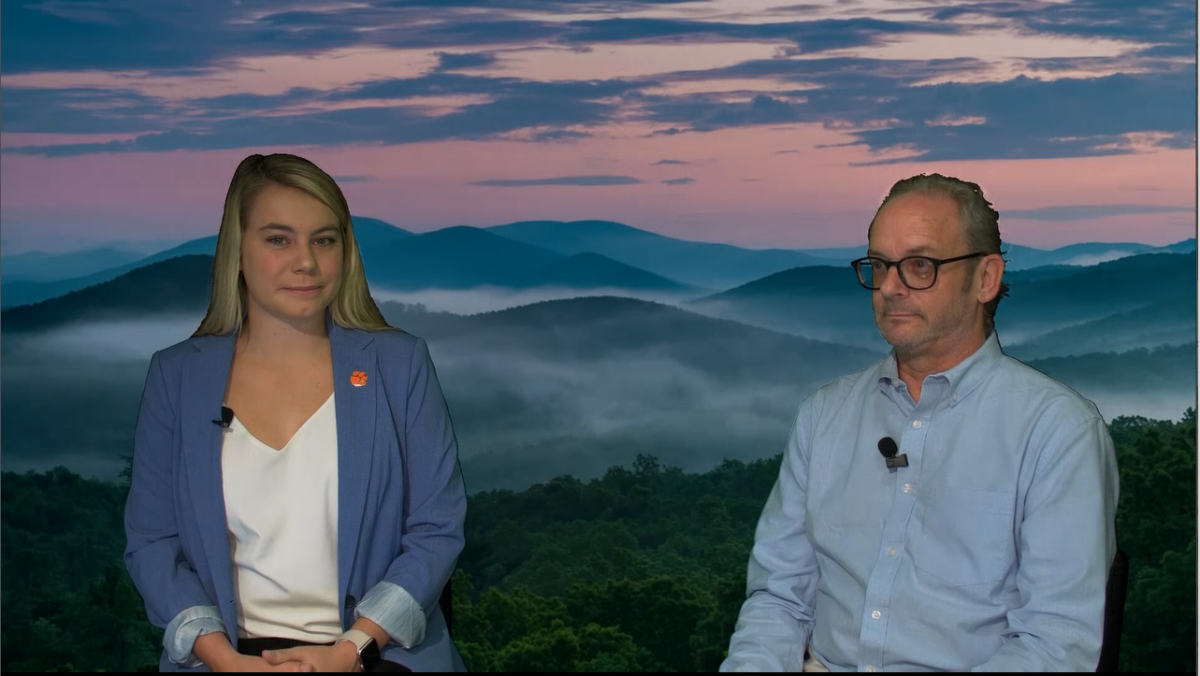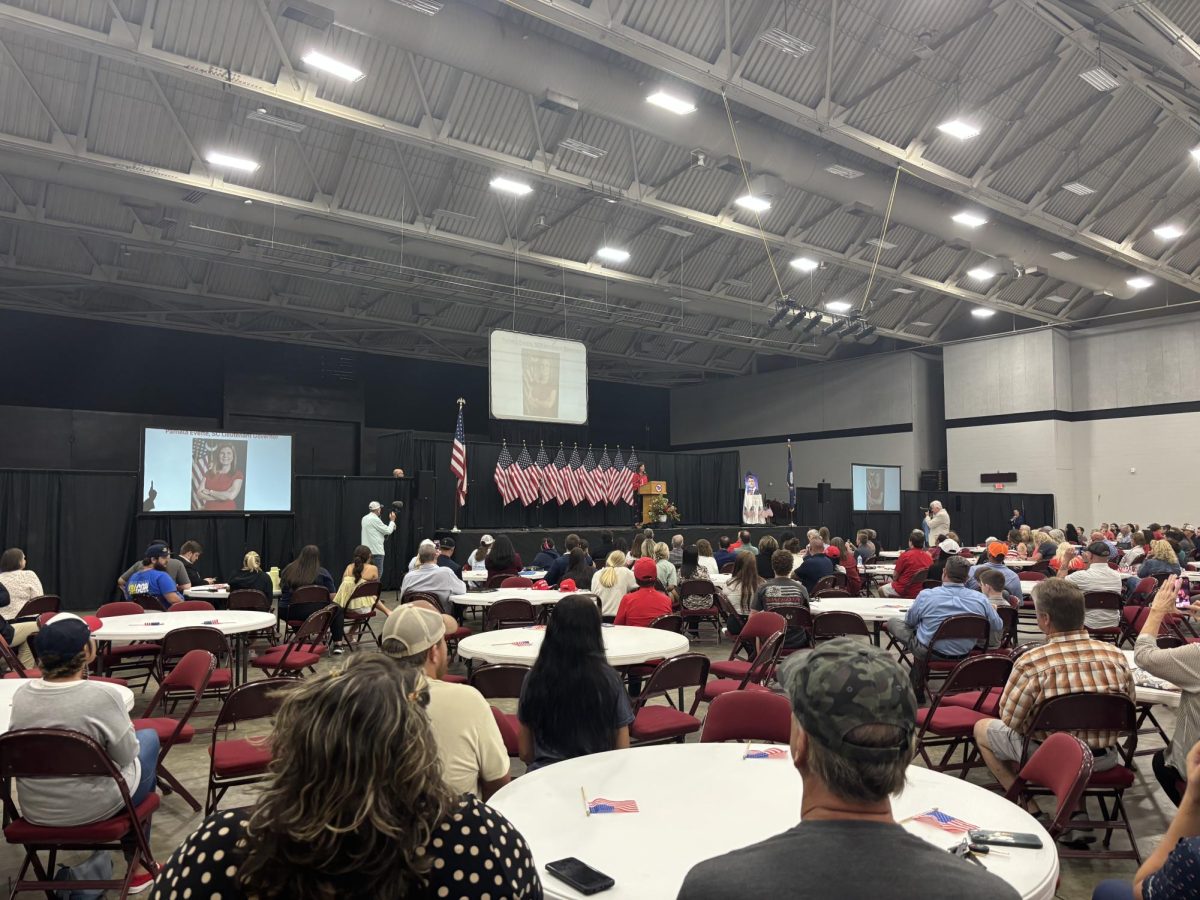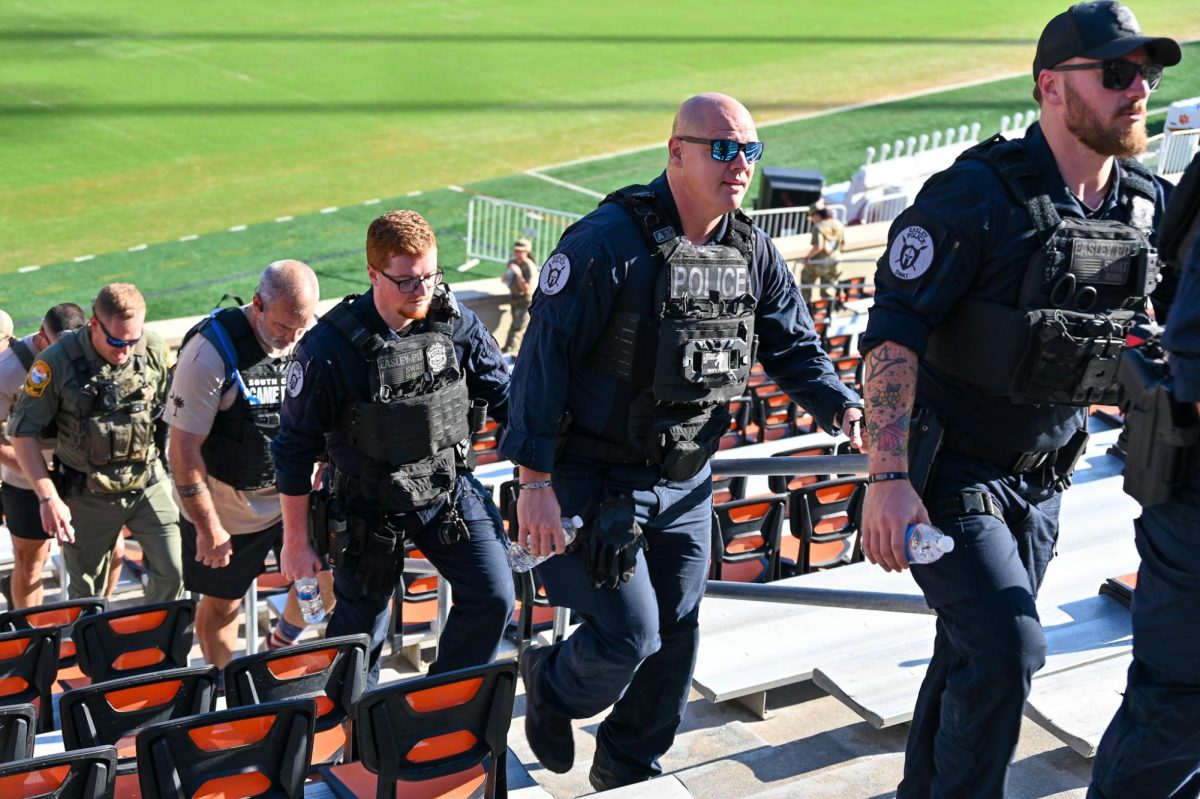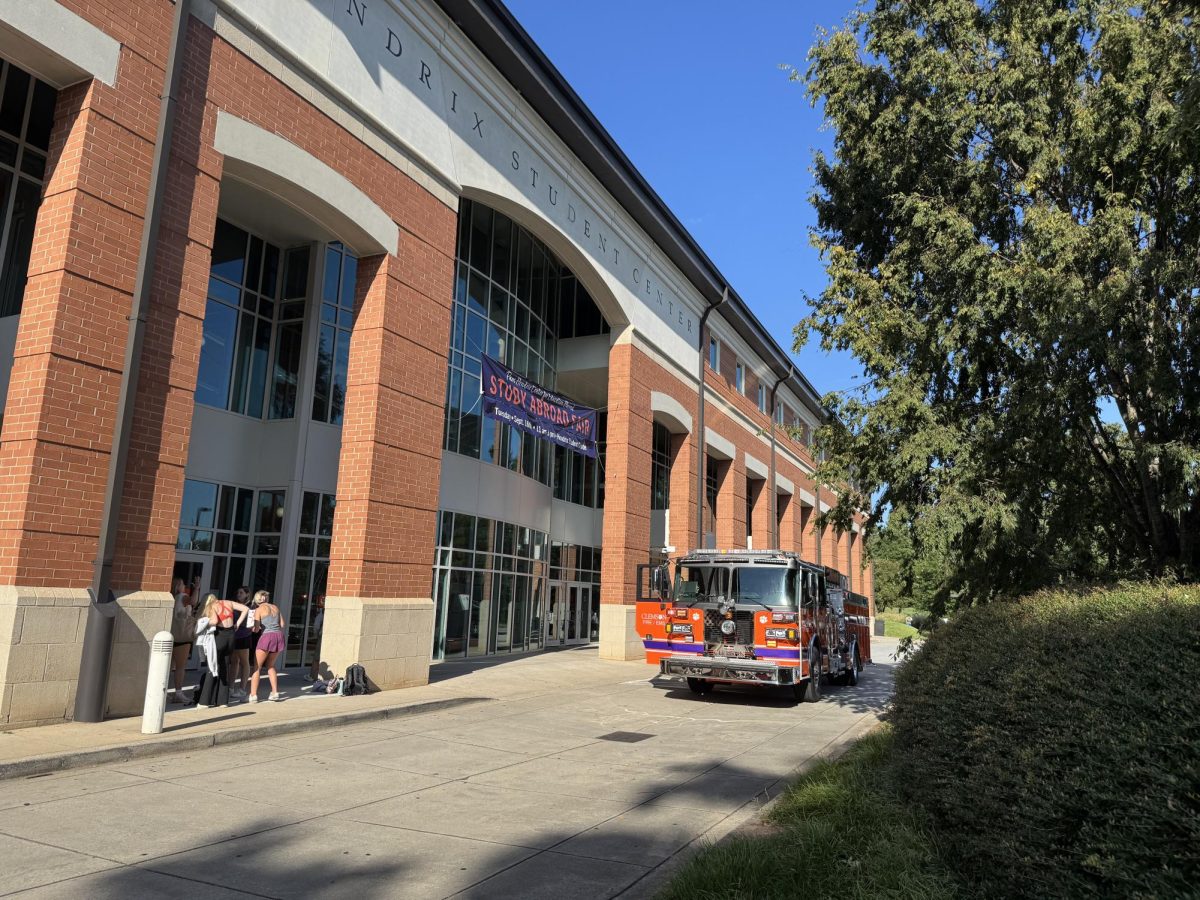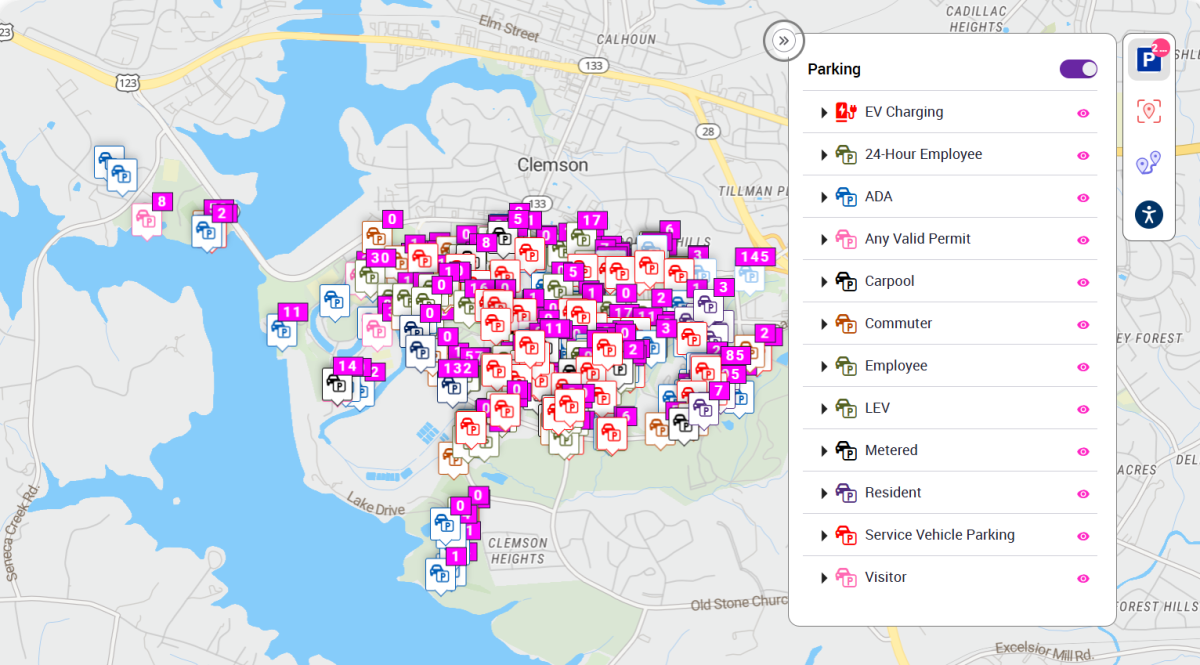On Thursday, Oct. 10, The Tiger’s Senior Staff Writer Geoff Gilson worked in conjunction with Tigervision to interview Student Body President Logan Young on some of the most pressing issues at Clemson. The full transcript of the interview is below.
Disclaimer: The views of individuals in this interview do not necessarily represent the views of The Tiger as an organization.
(Note from Tuesday, Oct. 29, 2019: On Thursday, Oct. 24, 2019, the original video was altered to correct a mistake per the request of speaker. The same mistake has been corrected in the transcript below. However, an incorrect version of the video, which was missing part of the interview, was uploaded. The correct version has now been reinstated.)
Geoff Gilson: Logan, Clemson spends 800 million dollars a year on its operating budget. Student fees account for some 400 million dollars of that. And yet there is no student representative officially on the Board of Trustees. What do you think about that?
Logan Young: I think it’s kind of more of a modern dilemma. I think as students are becoming more vocal, especially with youth movements today, with climate change, gun control — those kind of things — the youth is becoming much more important. I think that we have started to be able to move towards a level of professionalism within the role of student body president that eventually one day there could be a student representative. Right now, the biggest challenge to that is the will of Thomas Green Clemson, because when he started the university, he set it up to where the Board is set up a certain way, and the only way to add a member would be to challenge the will.
GG: Well, okay. You can’t actually appoint a student body representative who can vote and who can speak. But isn’t it possible to have one appointed ex officio so that they attend, and not vote, and still be in compliance with his will?
LY: Right. That’s what we have sort of begun talking about because I already attend and go as…technically an ex officio — more like a guest in the room type thing. And I do get to present to them twice a year. So it’s not officially ex officio, but we are talking about making that role kind of finalized and official.
GG: Also, for the people who don’t know, there are thirteen trustees on the Board of Trustees. Seven are the will’s trustees, and six are appointed by the legislature. Has the student government ever thought of approaching the legislature and asking them to make one of their six the student body president?
LY: We actually talked about that last year, just kind of like a funny joke — ‘Oh, that would be crazy.’ But we work with our governmental affairs department, Beth Bell, a lot. And the hardest part, honestly, is that we’re students and we can’t attend everything that a board member would be required to attend just because we have class. We’re not lawyers or doctors or anything yet. We’re on our way to miss class. To do all of that would be incredibly challenging. So that’s probably the biggest obstacle when it comes to finding out our role within the Board of Trustees.
GG: Okay. What would you say to students who say we don’t really know much about student government? They don’t really seem to be around very much. And we don’t know what they do and whether they do anything at all. What would you say to those students?
LY: I would say, think about anything and everything you’ve ever used, that’s not academic, and student government has probably had a role in it. Whether that’s the TigerFlix, when you get campus football tickets — whether you’re happy or not with those — any of those types of things, we have had a hand in some way, shape or form.
GG: Do you think student government could do more to reach out to students?
LY: I think we do a ton to reach out to students. I think the hardest part is making people realize how they can use us, like we are a really easy avenue to get things done that people want to get done. If they will just come to us, instead of trying to rally around and figure out where to go with what, we can help them and make things go so much smoother.
GG: Okay. I’m going to turn to a slightly tricky subject now. As you know, there was an alleged sexual assault in Cooper Library last week. Cooper Library is somewhere that students generally feel safe. Does it scare you that there was an alleged sexual assault there?
LY: That is an interesting question because my friends were kind of freaked out when we saw that. We were like, ‘Wow, that’s so odd because it’s a library.’ And like you said, alleged. So I don’t know what happened…but it is concerning, of course. But I know this was responded to with increased security, increased measures to make it safer. I personally have never been scared in the library. I love the library. I think it makes people wake up a little bit and realize that this is a city, a town. There are people that are not students. So I think that’s a necessary precaution that people kind of forget about. And I think it popped that sort of college bubble is what I call it, that people in and here they think only college exists, we’re the only people here. But we’re not. And that’s kind of a sad reality, is that there are people who could do, you know, the world’s unnecessary evils within our campus. (Note from Monday, Oct. 28, 2019: The phrase “necessary evils” was changed to “unnecessary evils” on Thursday, Oct. 24, 2019 as per the request of the speaker. The wrong word was mistakenly used by the speaker in the interview and was not caught by the speaker until after publication.) But part of what we’re trying to do with student government is make sure we’re keeping people safe in the appropriate ways, whether that’s working with CUPD, the security in the library or anything like that was always a little unnerving. But I still don’t feel unsafe. I think I’m pretty aware when I’m sitting in the library.
GG: I was watching a television newscast. We don’t have a copy of it here, so you’re just going to have to take my word for it. A female student was recorded on that newscast saying, these were her words, ‘The scary thing is that this was in the library, not in a dorm or something.’ What is your feeling about someone saying that about the dorms?
LY: That, obviously, is concerning, but the dorms are especially unnerving. I think for freshmen, because it is mostly freshmen who live on campus, because the fact that you can close and lock a door can be intimidating. I think people associate intimacies that do occur during sexual assault with things that go on in the bedroom. I think people would assume that the only place they’re at risk is in their dorm rooms or residence halls but I think now people are realizing it’s anywhere. My sorority works with the fight against domestic violence. So everyone in my sorority is very much aware that the library is as much of a possibility as Daniel Hall, as Tillman Hall, as the middle of Bowman. It’s just kind of when and where; it’s not necessarily confined to just the bedroom.
GG: You use the word ‘risk.’ Do you think there should even be this much risk in dorms?
LY: I don’t think there should be. But like I said, I think the sad reality of the world is that people do the world’s evils, sometimes unknowingly, sometimes not realizing what they’re doing. A big part of that risk is education. We talk about Greek life a lot and people commonly associate assault and binge drinking — that kind of thing — I think, with Greek life. But I think that the reality of it is Greek life is only 25 percent of school. They’re very well educated, very well trained. They’re the most trained and educated as far as any kind of risk on campus. But it’s the other 75 percent we struggle to educate on risk management in any kind of balance like that.
GG: I’m trying to understand why you make a distinction between Greeks and the rest.
LY: So like, traditionally, schools considered Greek life as an at-risk population for assault or binge drinking or alcohol poisoning, hazing, etc. So they’re very educated and trained within our Greek-affiliated organizations. So, that group that does participate in Greek life is very well trained and educated on the risks of drinking, the risks of assault, how to prevent [them]. Very well educated on that. But then the other 75 percent of the school doesn’t get that training because that training is specific to Greek life.
GG: I’m wondering if you’ve seen the same Clemson University Safe Alert that I saw last Sunday, which described the alleged assailant as wearing khakis, a blazer and a button down shirt. Now, we know we don’t have any details, but is it reasonable to say that your average student is going to hear that description and, in their mind, they’re going to think of a particular type of campus individual?
LY: I don’t think that’s unreasonable. But I also think that Sunday is like a church day, especially in the south. So it’s a lot of people coming from church, which may seem even more twisted that someone would come from church…
GG: Okay. Let me just clarify. The alleged assault took place on Thursday…the alert went out on Sunday…
LY: Oh yeah, yeah. The assault was on Thursday, you’re right. I don’t know. I think it depends on what your experiences are on campus. With who you traditionally see…
GG: Ok. Let me ask you this question. I’m going to preview it by saying it’s a tricky question. If you want a moment to think about it, that’s fine. With that description, do you think it’s fair to say that we still have a Greek problem on campus or that Greeks may have a problem on campus, in that somebody may be disguising themselves as one to get away with this sort of thing?
LY: Interesting. I don’t think we have a Greek problem at all. I think Greek life not only improves your GPA, but your educational resources on campus. It keeps you plugged in. It keeps you really attached to Clemson. It’s a great, great system. I think that anybody could walk around in khakis, a button-down and a blazer. We see it all the time. I don’t think anybody’s trying to impersonate Greek life. I don’t think they’re trying to assume it’s somebody. I think it’s just a general guy.
GG: I mean, to be fair to everyone watching as well, I am wearing a button-down shirt, actually wearing khakis. And I will say that, yesterday, I had to wear the same outfit, because I had to give a speech in my public speaking class, and I had to look proper. As I walked through campus, though, I felt awkward and I was given some awkward glances. So I’m trying to make this question balanced. Is it the Greeks, or should they be concerned that someone would do this? Another blunt question: do we have a rape culture on Clemson campus?
LY: I think that the world has a rape culture right now. I think it’s something that’s not talked about that should be, and we talk a lot about that within my sorority because that is our philanthropy; that is, the fight against domestic violence. It’s an interesting question because some people would argue that assault doesn’t happen on campus. Some people would argue that it’s harder on campus. Other people argue it’s just not reported. It just depends. I think the trickiest part of Clemson is that campus ends at Perimeter Road and a lot of the social things that happen are right across the street from there. So then, technically, they’re off-campus. And I think where people struggle is to report anything that happens. It’s not the university police; that would then be the city police department.
GG: Let me pick up on that reporting. A number of people who’ve spoken to me, because, as you know, I write for The Tiger newspaper. I have written about this. I monitor people who’ve come up to me and said, if you want to look at something, look at the CARE reporting process. They are concerned at — what they regard sometimes as — the heavy-handed consequence of the CARE reporting process. I’m not sure if this is something that you’re more familiar with, but I know that there are some advocates who would prefer to have the reporting process changed.
LY: I have heard that. I have never been involved with CARE reports specifically because those are very confidential to the students who they’re involved with. But I have had a couple of people come to me and say, hey, I think that sometimes the consequences are too extreme. I have heard that before. It’s not uncommon to hear that. I think the hard part for this school is distinguishing what is an emergency and what is not. And, because of the high volume of CARE reports, they might not necessarily have the time or resources to take the time to figure out what is an emergency and what’s not. I know that’s something they’re constantly working on and fine-tuning, you know? when do you have the heavy consequences? When do you not?
GG: Okay. I know that, after this interview today, you’re going to be going to one of the Board of Trustee meetings. I’m not sure if you’re going to be making a report or not, but have you in the past and will you be considering in the future raising with them spending more money on CAPS? And also on CARE? I know a couple of people have come to me and talked about there being a waiting list for counseling services on campus. Is this something student government is dealing with?
LY: So every year, actually, we always beg and beg and beg for more CAPS representatives, more employees for the CARE reporting process. We talk and talk and talk about that all the time, and last year they hired two more CAPs professionals, which granted it’s just two. But it has improved a lot. I mean, two more is two you didn’t have before they added to the staff. So we’re constantly working on ways to improve those resources. They also added an online group therapy session so you can join anonymously online. And that has helped a lot. Decreasing those in-house waiting times, mainly because some people as students, you know, aren’t necessarily comfortable going to a group therapy session. And a big thing we didn’t think about was graduate students and T.A.s being in the same room as one of their students. So the online anonymous module has helped with that a ton because that can be a bit of an awkward encounter, especially for a confidential situation. We just wouldn’t want that to ever impact a teacher-student relationship. So, we’ve seen a lot of progress. But of course, the biggest thing is space on campus. So what we really need is a new building. That’s something we’re beginning to figure out, OK. How exactly do we do that? Because it would be such a big renovation that it would have to go through the state legislature.
GG: Ok. Well, more reasons possibly to have a student body president actually sitting on the Board of Trustees. We’ll keep working on that one. Couple more questions about rape culture and then we move on to some other stuff, which is not to minimize its importance. A couple of difficult questions, I’m giving you warning. Do you think that mandatory expulsion should be the penalty for any individual, regardless of gender, who is found proven to have engaged in an act of sexual victimization?
LY: That’s an interesting question. I don’t know.
GG: Can you think of any reason why not? I’ll let you think. While I perhaps give you my thinking. I’m a sophomore. I’ve been here a year and a bit. But as you know, I’m a little bit older than your traditional student. I’ve been around the world a bit. And it seems to me that a lot has been tried with education and sanctions and it’s not working. I’m wondering if the ultimate sanction as an absolute mandatory penalty might on the one hand remove the problem, on the other hand, deter. What do you think?
LY: I don’t disagree with you on that. I think too, the caution is a witch hunt, because if there was a guy who I just decided I didn’t like, I could probably have him expelled for that.
GG: But just bear in mind, there would have to be a process.
LY: Right. There would be a process. I don’t think it would be a bad thing. But I don’t know that that would even stop the problem. Because, again, a lot of times these situations come down to either evidence gets mishandled, reporting goes wrong or something within the process doesn’t happen the way it’s supposed to. And if that happens, then you have a woman or man, whichever gender, feeling as if they didn’t get their justice.
GG: Same sort of question. Do you think that mandatory expulsion should be considered for people who retaliate against or intimidate someone who has reported an act of sexual victimization?
LY: That’s another interesting question. I can’t … I’m not 100 percent sure, but I think it walks that fine line of you could start a witch hunt because what one person means or says doesn’t necessarily co-align with what someone interprets it as. Like you and I are both very outspoken people, very outgoing. We could intimidate someone easily and not even intentionally.
GG: Moving along. I’m not minimizing that, but we’ve spent a lot of time on it, which, I think, shows how important we both feel it is. I think I personally will be lynched if I don’t ask you: what is student government doing about parking on campus?
LY: Parking! The infamous question. So, believe it or not, we actually don’t have a parking problem. We have a parking education problem. Okay. So only 85 percent of spots are used on a daily basis. Which means at any given time, 15 percent, that even the busiest 15 percent of the spots on campus are open.
GG: Now, let me just cut in there and ask you a question. Sorry to cut in. I’ve actually spoken with Johnson Link on this. He used to be in charge of parking, and I spoke with him because I am disabled and my particular interest is disabled parking. And I find myself always looking for spots. And he’s said one of the problems is in the studies we have. They take in all of the parking, including the stuff in the outlying areas. So when only 85 percent of the parking is being used, is that actually 85 percent of the parking near study halls, or is it all of it?
LY: All of it as a whole. So, granted, I don’t know about the breakdown between employee versus commuter, but that means somewhere there’s 15 percent of spots. We have, of course, popular parking lots that students would rather be in like the one behind Brooks Theater. I’m sure you see videos of: “Oh, my gosh, it’s packed.” So people always want to park there, but at peak times, it’s not available. They might have to go as far as R6, or the commuter lot down at Y-Beach, which, granted, is not ideal if you want to be able to walk to your car and walk back. I understand that, I get it, but it’s the reality we’re facing right now is that we just have so many commuters. So they’re trying to up the buses and they’re trying to make them run as often as they can, especially during those peak times, to get people to and from the parking lots to get them on and off campus as quickly as they need. We’re also working with parking services on a new technology. Have you see the things where they read the license plate and count how many people are in the parking lots?
GG: I haven’t. But Johnson Link mentioned it.
LY: So we’re working the kinks out of that because there’s kind of a leeway of, you know, do they count the car? Do they count the license plate? I think we settled on license plate. So it’s pretty accurate. It’s up and running now on my.Clemson. So you can check it and see which parking lot is full or open. Granted, it’s probably not 100 percent accurate yet, but we’re working towards that throughout the year.
GG: Why did you decide to stand as student body president?
LY: That is the age-old question.
GG: Yes, it is.
LY: So, my story is a little different than I think most student body presidents before me because I was the vice president before I was president. And the biggest need I saw at Clemson in general as a whole was a need for consistent student leadership. Because with such turnover, you know, one year, it’s really as soon as you start, you’re already out the door. So I saw the need for consistent student leadership and I thought, you know what? I have grown so much in the past year and learned so much. I really need to do this. I think this is the best way I could give back to anyone and it has just been a phenomenal experience. And people think it’s like fun all the time and just games. And you do a lot of interviews and fun public appearances. It’s a lot of hard work. It’s a lot of dirty work people don’t see. And it really is a lot more than I think people when they initially decide to run, realize they sign up for it. So, I thought I knew what I was getting into. I had the right intentions and I was just so excited to do it.
GG: Most interviewers would ask you what your best moment was. What was your worst moment?
[…]
LY: I think my worst moment was probably when we started to find out about the pool closing at Fike. And just the indefinite closure, no real plans to take over because I grew up swimming and I actually swam at the Clemson pool. I was supposed to swim here, but then the swim team got cut, and the swimming culture in Greenville is the biggest in the country. So literally 45 minutes away, we have the largest swim community in the entire country, which is pretty cool. But I got my first national cut at the club. It’s a fast pool and it’s really fun. So I was already, you know, upset in high school when they cut the Clemson swim team. So I was pretty upset about the pool. But then I realized: you know what? Like, we had the power to do something about this, like so much more than just club swimming and, you know, whoever uses it. Clemson life uses it. ROTC uses it. Classes are taught there. We do so much first aid and water training. We do scuba training there. There was a lot more need for it than I think was initially realized. So we were able to work with the school and work through that, which actually ended up being one of my best moments, in turn, because I was like: “yes, the pool is open for another year.” We’re going to figure out a long-term plan and figure out where to go from there.
GG: Does the student body president serve for just one year or can they serve for more than one year?
LY: So, you can serve for more than one year, but to be qualified, you have to have the credit hours of a senior. And then, you would have to have a certain GPA. So you would have to be, I guess, a sophomore who is a rising junior that had the credits of a senior to run twice.
GG: Do you think this in any way interferes with continuity or institutional memory?
LY: That’s a good question. I don’t think it does, because to be vice president, you only have to have enough credits to be a sophomore. So that is a very open position that is open to the younger side of Clemson, if that makes sense. And that’s a great place to learn and grow and be developed to be student body president. I, for me, ideally that would be how it would go forever. But of course, that’s not the case because it is a lot to sign up for, for two years. But I think that’s the best way for it to happen.
GG: Now, obviously, you’re thinking about your career. Would you say that being student body president has in any way affected your life choices?
LY: Oh, I don’t know. In a way, it completely has. But in a way, I think I’m still me and I still want to do what I want to do for why I chose it in the first place. I’m a nursing major. So, a lot of people, when I’m in these meetings or whatever, like you’re in nursing and that doesn’t make any sense. You should be PoliSci. You should go to law school. You should run for office. And I’m like, no, no, no. I love nursing. I love medical. I love caring for people, and what better way to care for people than to serve as a leader? And we talk about it all the time in nursing. There’s not enough nurses in positions of advocacy, but the definition of nursing is essentially a patient advocate. So, they really play off of each other. And I think, you know, the therapeutic communication I’ve learned, the ways I’ve learned the hospital runs, the way I’ve seen this school run, I’ve been able to put those together. And I’ve started to have this dream of running a big hospital system that runs super efficiently and is very low cost, very low maintenance. It has like the greatest nurses and doctors in the world. So that’s kind of become a new dream of mine that I didn’t necessarily have before. I realized, you know, how it’s possible to run a business, how you run things efficiently. And I think both of those complement each other so well.
GG: Right, so, loads of students are going to watch this interview. We know that. And if they want to do it, say, ooh, I’ve got an issue. I need to raise it with Logan, or student government. What is the easiest way for them to contact you or student government?
LY: Easiest way is email. My email is [email protected]. I always check my email. It’s my lifeline. I keep everything in there. Or student government, you can just respond to our listserve. We send that out on Sunday, and it’ll come to the student government email.
GG: Thank you Logan, for answering my questions so patiently.
LY: Thank you, Geoff. It is a pleasure.



